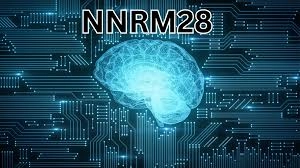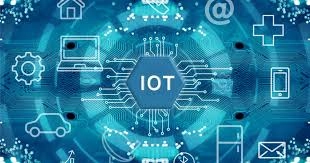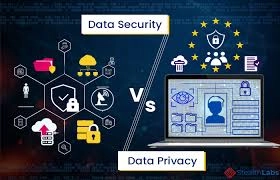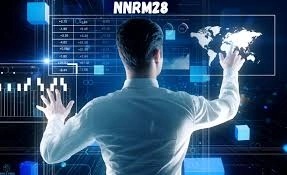But what exactly is NNRM28, and why is it being hailed as the ultimate future of technology innovation? Let’s dive deep into this transformative concept and explore how it is set to revolutionize our world. Technology has long been the driving force behind global change, with each era marked by innovations that redefine the way we live, work, and interact. In the current landscape, where rapid advancements have become the norm, a new wave of technological innovation is emerging, poised to reshape industries and societal norms. This wave is encapsulated in a single term: NNRM28. .
Understanding NNRM28

NNRM28, a term increasingly being discussed among tech enthusiasts and industry leaders, stands as an acronym that represents a confluence of several cutting-edge technologies. While the specifics of NNRM28 are still unfolding, it’s clear that it is more than just a single technology or innovation. Rather, it is an umbrella term that encompasses a suite of advanced technologies, methodologies, and frameworks that collectively promise to drive the next big leap in human progress.
NNRM28 is characterized by its focus on integration, convergence, and enhancement of current technologies to create solutions that were previously unimaginable. At its core, NNRM28 is about harnessing the full potential of existing technologies, such as artificial intelligence (AI), quantum computing, biotechnology, and the Internet of Things (IoT), to forge a future that is not only technologically advanced but also sustainable and equitable.
The Pillars of NNRM28
To fully grasp the impact of NNRM28, it is essential to understand its foundational pillars. These pillars are the building blocks upon which NNRM28 is constructed, each playing a critical role in shaping the future of technology innovation.
1. Artificial Intelligence (AI) and Machine Learning (ML)
Artificial Intelligence and Machine Learning have already transformed numerous industries, from healthcare to finance, by enabling systems to learn, adapt, and make decisions with minimal human intervention. In the context of NNRM28, AI, and ML are set to become even more sophisticated, driving the development of autonomous systems that can operate with unprecedented efficiency and precision.
AI will not only enhance existing processes but also create new opportunities for innovation by enabling predictive analytics, personalized experiences, and smarter decision-making across various sectors. As AI continues to evolve, its integration into the NNRM28 framework will lead to more intelligent systems capable of solving complex problems that were once thought insurmountable.
2. Quantum Computing
Quantum computing is often heralded as the next frontier in computing, offering the potential to solve problems that are currently beyond the reach of classical computers. NNRM28 leverages quantum computing to unlock new possibilities in fields such as cryptography, material science, and pharmaceuticals.
By harnessing the principles of quantum mechanics, quantum computers can process vast amounts of data simultaneously, enabling breakthroughs in research and development that could revolutionize industries. In the realm of NNRM28, quantum computing will be instrumental in tackling some of the most pressing challenges of our time, from climate change to disease modeling.
3. Biotechnology and Genetic Engineering
The intersection of technology and biology has given rise to biotechnology, a field that is pushing the boundaries of what is possible in healthcare and agriculture. NNRM28 envisions a future where biotechnology and genetic engineering are central to solving global challenges such as food security, disease eradication, and sustainable development.
Advancements in CRISPR technology, synthetic biology, and bioinformatics will enable scientists to manipulate genes with precision, leading to the creation of genetically modified organisms (GMOs) that can withstand extreme conditions, as well as personalized medicine tailored to an individual’s genetic makeup. NNRM28’s focus on biotechnology underscores its commitment to creating a healthier, more resilient world.
4. Internet of Things (IoT) and Smart Cities

The Internet of Things (IoT) has already begun to transform our daily lives by connecting devices and enabling them to communicate with each other. Under NNRM28, IoT will play a crucial role in the development of smart cities, where infrastructure, transportation, and services are optimized for efficiency and sustainability.
Smart cities powered by IoT will use real-time data to enhance urban living, reduce waste, and improve public safety. From smart grids that manage energy consumption to autonomous vehicles that reduce traffic congestion, the integration of IoT into the NNRM28 framework will lead to cities that are not only more livable but also more environmentally friendly.
How NNRM28 Will Transform Industries
The impact of NNRM28 will be felt across a wide range of industries, each of which will experience significant changes as a result of these technological advancements. Let’s explore how NNRM28 is poised to revolutionize key sectors.
1. Healthcare and Medicine
The healthcare industry is on the cusp of a transformation, driven by the integration of AI, biotechnology, and quantum computing under the NNRM28 framework. AI-powered diagnostic tools will enable earlier detection of diseases, while quantum computing will accelerate drug discovery by simulating complex molecular interactions.
Moreover, the advent of personalized medicine, made possible by advancements in genetic engineering, will allow for treatments that are tailored to an individual’s genetic profile, increasing their efficacy and reducing side effects. NNRM28’s impact on healthcare will ultimately lead to longer, healthier lives and a reduction in the global disease burden.
2. Finance and Banking
The finance sector has always been at the forefront of technological adoption, and NNRM28 will further accelerate this trend. AI and ML will continue to revolutionize financial services by enabling real-time risk assessment, fraud detection, and personalized financial planning.
Blockchain technology, another component of NNRM28, will enhance security and transparency in financial transactions, reducing the need for intermediaries and lowering costs. Quantum computing, with its ability to process complex calculations at lightning speed, will also play a crucial role in financial modeling and forecasting, giving rise to more accurate and reliable predictions.
3. Manufacturing and Industry 4.0
The manufacturing sector is undergoing a significant shift towards automation and digitalization, a trend that NNRM28 will amplify. The integration of AI, IoT, and robotics will lead to the creation of smart factories, where machines communicate with each other to optimize production processes and reduce waste.
Industry 4.0, the fourth industrial revolution, will be characterized by the use of advanced technologies to create more efficient, flexible, and sustainable manufacturing practices. NNRM28’s influence on manufacturing will result in increased productivity, lower costs, and a reduced environmental footprint.
4. Education and Learning
Education is another sector that will be profoundly impacted by NNRM28. AI-powered learning platforms will provide personalized education experiences, catering to the unique needs and learning styles of each student. Virtual and augmented reality (VR/AR) technologies will create immersive learning environments, enabling students to explore complex concepts in a hands-on manner.
Moreover, the global reach of digital education platforms will democratize access to quality education, breaking down geographical and socio-economic barriers. NNRM28’s impact on education will lead to a more informed and skilled workforce, capable of driving further innovation in the future.
Challenges and Ethical Considerations of NNRM28
While the potential benefits of NNRM28 are immense, it is essential to acknowledge the challenges and ethical considerations that come with such transformative technology. As we move towards a future shaped by NNRM28, we must address these issues to ensure that the technology is used responsibly and equitably.
1. Data Privacy and Security

The integration of AI, IoT, and quantum computing in NNRM28 raises significant concerns about data privacy and security. As more devices become connected and more data is generated, the risk of data breaches and cyberattacks increases. Ensuring the security of personal information and sensitive data will be paramount in maintaining public trust in these technologies.
Governments, industry leaders, and tech developers must work together to establish robust data protection frameworks and implement advanced encryption techniques to safeguard against potential threats. Failure to address these concerns could hinder the widespread adoption of NNRM28 technologies.
2. Ethical AI and Bias
As AI systems become more integrated into our daily lives, the ethical implications of their use must be carefully considered. AI algorithms are only as unbiased as the data they are trained on, and there is a risk that these systems could perpetuate or even exacerbate existing biases.
To mitigate this risk, it is crucial to develop transparent and accountable AI systems that are designed with fairness and inclusivity in mind. Ethical guidelines and regulatory frameworks must be established to ensure that AI is used to benefit all members of society, rather than reinforcing inequalities.
3. Job Displacement and Workforce Transition
The automation and digitalization driven by NNRM28 will inevitably lead to job displacement in certain sectors. As machines and AI systems take over tasks previously performed by humans, there will be a need for workforce transition and reskilling.
Governments and educational institutions must take proactive steps to provide training and support for workers affected by these changes. By investing in education and lifelong learning initiatives, we can help individuals adapt to the new job market and ensure that no one is left behind in the transition to an NNRM28-driven economy.
4. Environmental Impact
While NNRM28 technologies have the potential to drive sustainable development, there is also the risk that they could contribute to environmental degradation if not managed properly. The production and disposal of advanced technologies, as well as the energy consumption of data centers and quantum computers, could have significant environmental impacts.
To mitigate these effects, it is essential to prioritize the development of green technologies and sustainable practices within the NNRM28 framework. By adopting a circular economy approach and investing in renewable energy sources, we can minimize the environmental footprint of technological innovation.
The Role of Global Collaboration in NNRM28
The successful implementation of NNRM28 will require global collaboration across governments, industries, and academia. No single entity or nation can fully realize the potential of these technologies in isolation. By working together, we can pool resources, share knowledge, and address the challenges that come with such transformative innovation.
1. Government and Policy Makers
Governments play a crucial role in shaping the future of technology through regulation, funding, and policy-making. To support the development and deployment of NNRM28 technologies, governments must create favorable environments for innovation, including the establishment of regulatory frameworks that balance technological advancement with ethical considerations.
Public investment in research and development, as well as the creation of public-private partnerships, will be essential in driving NNRM28 forward. Additionally, international cooperation on issues such as cybersecurity, data privacy, and environmental sustainability will be vital to ensuring the responsible use of these technologies.
2. Industry Leaders and Innovators
The private sector will be at the forefront of NNRM28 innovation, with industry leaders and tech companies driving the development and commercialization of new technologies. Collaboration between companies, startups, and research institutions will be key to accelerating the pace of innovation and bringing NNRM28 technologies to market.
Industry leaders must also take responsibility for addressing the ethical and environmental challenges associated with NNRM28. By adopting corporate social responsibility (CSR) initiatives and investing in sustainable practices, companies can contribute to the creation of a future that benefits both society and the planet.
3. Academic Institutions and Researchers
Academic institutions and researchers play a critical role in advancing the scientific knowledge that underpins NNRM28 technologies. By conducting fundamental research, developing new methodologies, and educating the next generation of innovators, academia will be instrumental in shaping the future of technology.
Collaboration between academia and industry will be essential in translating research findings into practical applications. Additionally, academic institutions must prioritize interdisciplinary research, bringing together experts from fields such as computer science, biology, and ethics to address the complex challenges posed by NNRM28.
The Future of NNRM28: What to Expect

As we look to the future, it is clear that NNRM28 will play a central role in shaping the next era of technological innovation. While the exact trajectory of NNRM28 is still unfolding, there are several key trends and developments that we can anticipate in the coming years.
1. Continued Integration of AI and Automation
The integration of AI and automation into various aspects of daily life will continue to accelerate, leading to smarter, more efficient systems. From autonomous vehicles to AI-driven customer service, the influence of AI will be pervasive, transforming industries and creating new opportunities for innovation.
2. Breakthroughs in Quantum Computing
As quantum computing technology matures, we can expect to see significant breakthroughs that will unlock new possibilities in fields such as cryptography, materials science, and pharmaceuticals. These advancements will have far-reaching implications, driving progress in research, industry, and beyond.
3. Expansion of Biotechnology and Personalized Medicine
Biotechnology and personalized medicine will continue to advance, leading to more effective treatments and solutions for global health challenges. The ability to tailor medical treatments to an individual’s genetic makeup will revolutionize healthcare, improving outcomes and reducing costs.
4. Growth of Smart Cities and IoT
The development of smart cities, powered by IoT and data analytics, will transform urban living, making cities more sustainable, efficient, and livable. From smart grids to connected transportation systems, the growth of smart cities will be a key aspect of NNRM28’s impact on society.
5. Increased Focus on Sustainability
As the environmental impact of technology becomes more apparent, there will be a growing emphasis on sustainability within the NNRM28 framework. The development of green technologies, renewable energy sources, and sustainable practices will be critical in ensuring that technological progress is aligned with environmental stewardship.
Conclusion
NNRM28 represents the ultimate future of technology innovation, a confluence of advanced technologies that promise to revolutionize industries, improve quality of life, and address some of the most pressing challenges facing humanity. As we stand on the cusp of this new era, we must approach the development and deployment of NNRM28 with a sense of responsibility, collaboration, and foresight. For more information please get in touch